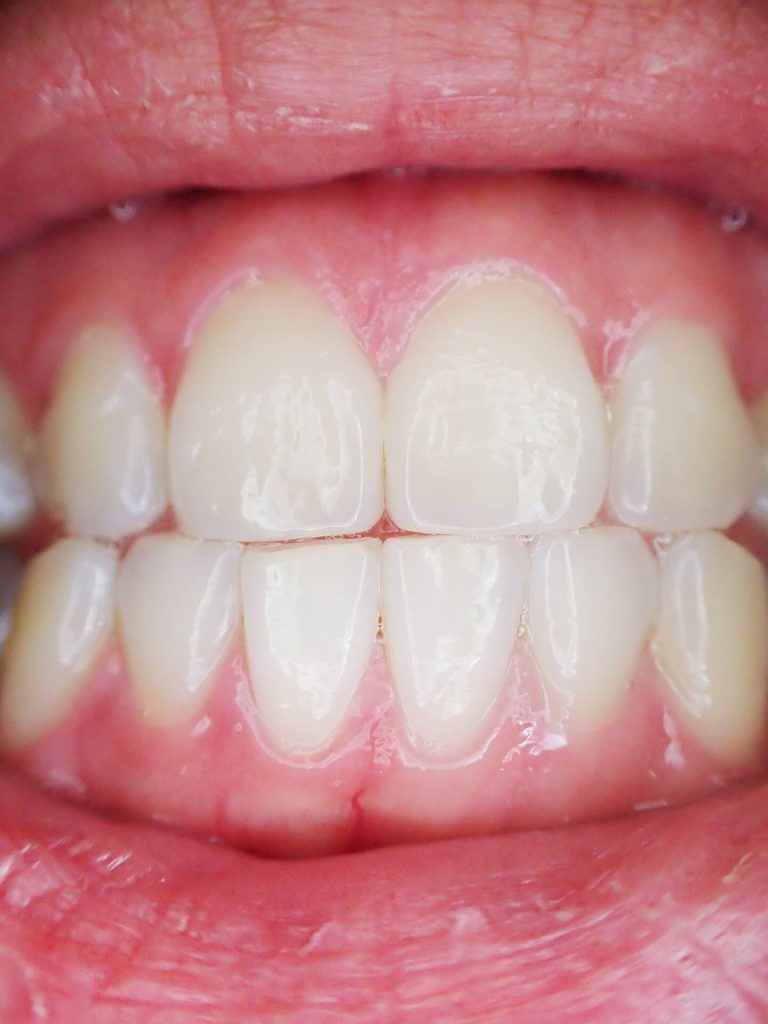What are receding gums?

Receding gums are a common dental problem that many people will experience. Recession can be caused by a number of things, including harsh brushing, genetics, gum disease and bruxism (teeth grinding). One of the main problems with receding gums is that the condition is gradual, and patients do not realise their gums are receding.
Visiting your dentist once every six months will help keep on top of your oral health and the threat of receding gums and gum-related diseases.
Gum recession is a fairly common dental issue that makes your gums recede, exposing more of your teeth and their roots. Many people do not know they receding gums, because gum recession happens gradually and often goes unnoticed.
Why are receding gums bad?
When your gums recede, they leave your teeth open to harmful bacteria and diseases caused by this bacteria.
Your gums protect your teeth in two ways: first is the attached gingiva, which connects your teeth to the bone, the second way is the gingival mucosa, which protects the insides of your gums and cheeks. Where we notice the recessions is known as the gingival margin, the gums that surround our teeth. When the gingival margin pulls away from your teeth, it leaves ‘pockets’ where bacteria can attack the roots. If left, this can lead to tooth decay and even tooth loss.
Is there a way to stop your gums from receding naturally?
Unfortunately, your gums will not naturally grow back once they have receded. However, there are treatment options that can raise your gum line back up to its original position, and there are ways to stop receding gums from getting worse

There are a few ways to help stop your gums from receding further. If your gum recession is in its early stages, your dentist may be able to perform a deep clean, which flushes out any bacteria and tartar hiding within the gapped or pocketed areas. If the roots of your teeth are exposed, they will be cleaned and smoothed over to allow your gums to join back into their original positioning.
If bacteria still remains, you may be prescribed antibiotics to ensure all bacteria is eliminated. This is something that can be discussed with your dentist before treatment begins.
When deep cleaning is not enough
If your gums have receded to the point where cleaning will not solve the problem, you may require minor surgery to reposition your gums.
Common symptoms of receding gums
Below are some of the noticeable symptoms of gum recession:
- Long teeth – arguably the most common symptom of receding gums is your teeth becoming ‘longer’. While they are not actually growing, the recession of the gums make your teeth appear longer. The roots will become more visible and you may experience some discomfort when brushing.
- Exposed roots – following your teeth becoming ‘longer’ your roots will be present and very sensitive to the touch. If your roots are becoming exposed, you must take extra care when brushing. Use a soft-bristled toothbrush and do not brush too hard. You should also seek the advice of a dentist to help reverse the effects of your receding gums. You may find that minor surgery will be the most appropriate treatment option.
- Loose teeth – loose teeth occur when bacteria and periodontal disease begin forming under the gumline and around the teeth. If you neglect to have treatment on your receding gums, they will proceed further and develop ‘pockets’ where bacteria will begin to form and weaken the bone structure, causing teeth to loosen.
Treatments for patients looking to stop their receding gum lines naturally
While you may not be able to reverse receding gums naturally, there are natural treatments you can try:
- Oil pulling – many people still use oil pulling to help reduce the threat of plaque build up in their mouths. Take a tablespoon of oil and swirl it around in your mouth for between 10-20 minutes. This technique is used to remove any bacteria or food particles. Spit out the oil after use, rinse your mouth with warm water and brush your teeth.
- Salt water – a very common and natural cleansing treatment, swirling saltwater around your mouth for up to 30 seconds is thought to help remove bacteria and act as a steriliser. One tablespoon of salt and one small cup of warm water if all you need
- Brushing and flossing – nothing helps clean your teeth better than the standard practice of brushing and flossing. If your gums are sensitive, try using a soft-bristled toothbrush and flossing gently.
Alternative ways to stop tooth pain from receding gums
For patients who are experiencing minor discomfort regarding their receding gums, the following should help numb the pain:

Painkillers – over-the-counter painkillers are common treatment options for patients experiencing minor soreness and tenderness around the gums.
Antibiotics and surgery – if you are experiencing major discomfort, you should visit your dentist immediately. It may be that your gums have become inflamed and you require stronger medication or even surgery.
Surgery to your gums stop receding
If your gums have receded to the point where they are causing you extreme discomfort, surgery may be the only viable option. Fortunately, there are a few surgical treatment options to consider. One of the most popular is pinhole gum rejuvenation, a treatment which ‘pulls’ your gum line back to its original positioning. This is a minor surgery that has a swift recovery time (just one day).
Book in for your checkup today

Patients should return for a routine checkup twice a year to ensure their teeth and gums are in a healthy condition. We specialise in nervous patients, so if you haven’t been to the dentist for a while, or you’re worried about treatment, our team are dedicated to making your stay and relaxing and comfortable as possible.
For more information on the ways to stop receding gum pain, please do not hesitate to contact us.
Book your checkup today and begin your journey to a healthier smile and happier gums.





















